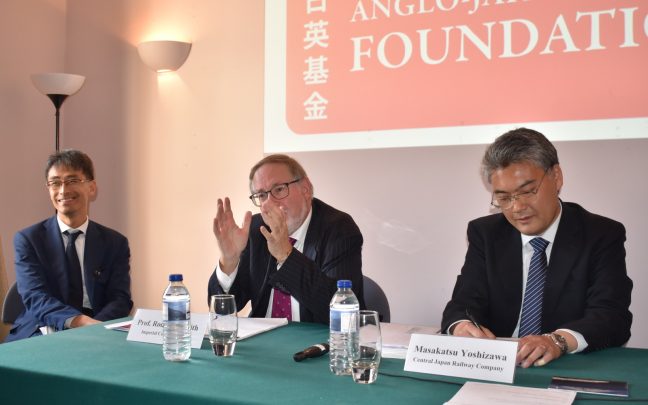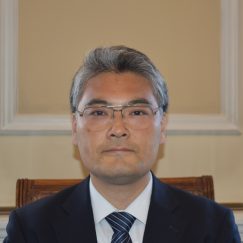 Seminar
SeminarThursday 25 April 2019
6:00pm – 7:00pm
Shinkansen and the Tokyo Olympics
Drinks reception: 7:00pm – 8:00pm
13/14 Cornwall Terrace, Outer Circle (entrance facing Regent's Park), London NW1 4QP
Organised by the Daiwa Anglo-Japanese Foundation
Fully bookedThe Shinkansen, or bullet train, is an icon of Japan. The trains are some of the fastest in the world, reaching top speeds of 200 mph, and are famously punctual, with average delays being below one minute. The first Shinkansen line, which opened in 1964 and connected Tokyo and Osaka, coincided with the previous Tokyo Olympics and marked the welcoming back of Japan into the international community after the war. Since 1964, as technology has developed the trains have become more sophisticated: the latest model, the N700S, which will debut before the 2020 Olympics, is expected to achieve further enhanced environmental performance, safer and more reliable transportation. As the Olympics returns to Tokyo, whilst Japan is facing new challenges, the country is still willing to adopt a long-term approach and invest in new infrastructure.
This seminar discussed the development of the Shinkansen between the 1964 and 2020 Olympics. Professor Roderick Smith, Imperial College London, gave a historical overview of transport in Japan and look at how the Shinkansen has captured people’s affection, before taking the audience on an imaginary Shinkansen ride. Masakatsu Yoshizawa, of Central Japan Railway Company (JR Central), talked about the technological developments of the railways and explained what the future holds. He went on to reveal how impressive safety and punctuality records have been achieved whilst also maintaining high-speed operations and transporting vast numbers of passengers.
Presentation by Masakatsu Yoshizawa Presentation by Professor Roderick SmithA video of the seminar can be found here:
About the contributors

Masakatsu Yoshizawa
Masakatsu Yoshizawa is Manager at the London Office of the Central Japan Railway Company (JR Central). After completing his Master’s degree at the Graduate School of Science and Engineering, Waseda University, he joined JR Central. He worked as a rolling stock engineer, working on the design of the Shinkansen Series N700 trains with manufacturers and conducting R&D activities to realise the next-generation traction / braking systems for Shinkansen rolling stock in Komaki. Masakatsu has also worked in international affairs and management at SCMAGLEV and Railway Park, which is a museum to introduce evolutions in high-speed railway. Since July 2017, he has been in London where he is responsible for enhancing relations with the UK railway industry, public relations activities in Europe and attracting more visitors to Japan.

Professor Roderick Smith
Professor Roderick Smith is an Emeritus Professor of Railway Engineering, Imperial College London and Chair of the Future Railway Research Centre. He is a recently appointed Infrastructure Commissioner for Wales and works for IHRA Japan. He was Chief Scientific Advisor to the Department for Transport from 2012-2014 and the 126th President of the Institution of Mechanical Engineers. Roderick was previously a lecturer in the Cambridge University Engineering Department and Professor of Mechanical and Process Engineering at the University of Sheffield, before becoming Head of Mechanical Engineering at Imperial College. He was a consultant to the Board of British Rail, 1992-96, and served for eight years as a Trustee of the National Museum of Science and Industry, which includes the National Railway Museum in York, to which he arranged the gift of an original series Zero Shinkansen from Japan.